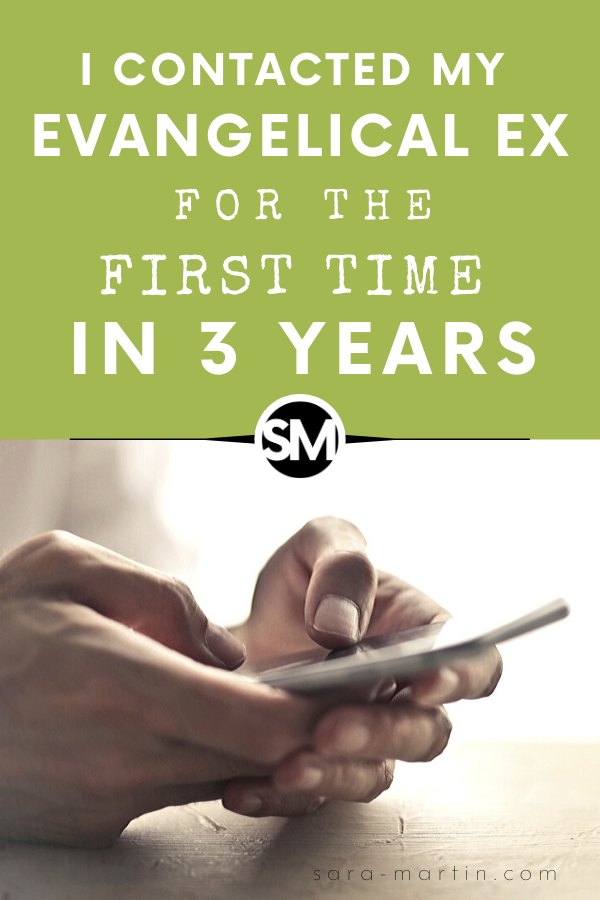Shit. His town got hit pretty bad.
My mind was buzzing as I scanned the headlines. The night before, a line of severe storms had ripped through the southern part of the country and claimed multiple lives. Each article repeated the same list of obscure suburbs that took particularly bad damage, including the one I last knew my ex-boyfriend lived in. So there I was, wondering if my ex (who I hadn’t spoken to in three years) or his family was among the storms’ victims.
While we were still dating, my relationship with my ex was heavily rooted in evangelical Christian legalism and purity culture. We met at the conservative Christian college we both attended and dated just shy of three years before I broke off our dating relationship. We attempted to remain friends, but as my faith and mental health unraveled in the months that followed, I ultimately decided it was best to cut off contact completely. Once my request to stop talking was made, he respected it. I never heard from him again.
That was three years ago.
Since then, I have dealt with diagnosed major depression; dove headfirst into deconstructing my former evangelical Christian faith; survived an existential and identity crisis; changed jobs four times; started two blogs and a YouTube channel; met and married my husband; and reclaimed my sexuality from purity culture. You could say a hell of a lot has changed for me since the chapter with my ex ended.
Despite the massive amount of mostly-positive changes during the past few years, my relationship with my ex has lingered over me like an unappeasable ghost. The problem wasn’t that I couldn’t “get over” my ex; it’s that so much of my religious deconstruction has been directly tied to the toxic beliefs that defined that relationship. And the deeper I walked into processing my past, the more I recognized how much unresolved shame, spiritual manipulation, and even trauma was tied to this one relationship.
Now as I read headlines that had me asking if my ex was even alive, I sensed a unique opportunity presenting itself. I had no idea what would happen if I reached out to him, but for the first time in the three years since we’d last spoken, I felt ready to take the risk.
Sending a message to someone you asked to stop communicating with you years prior feels like jumping into a pool blindfolded; you don’t know how quickly you’ll hit the water, whether it’ll be icy cold or warm like bathwater, or if there’s any water in the pool at all. There are no guides out there to tell you how to begin speaking again to a past partner with whom you share a complicated, indoctrinated past. But one message at a time, we began navigating this unknown territory.
To answer concisely the question of “What happened?” after I reached out, that first message initiated more than a month of back-and-forth emailing. We carefully tread talking through how we’d both changed over the past three years, who we currently were as individuals, and where we saw ourselves heading into our futures. As we became acquainted with the present versions of ourselves, we slowly began delving into the more painful parts of our shared history.
I am extremely fortunate in how my communicating with my ex panned out. In all of our corresponding, I felt heard. I felt my experience, both during and after our relationship, was validated. Everything I wished I could’ve said to him over the past few years, I was actually able to tell him. Without me saying so, he recognized the ways in which his actions likely caused me harm and was genuinely apologetic. And I was able to express empathy, validation, and regret for the ways I caused harm to him as well.
If there was ever a best-case scenario for reconnecting with my ex for the sake of finding closure, this was surely it.
I know from my own experience and from being part of multiple online ex-evangelical communities that deconstruction is often a painful and isolating process. Being able to make peace with hurtful parts of an evangelical background is not the norm. For once, though, deconstructing in this instance felt like re-constructing, like a stubborn wound finally transitioning into a faded scar.
Toward the end of our exchanges, my ex and I shared how we felt having been able to talk through all we did. We spoke mutually of feeling peace, experiencing healing, feeling like a dark cloud had lifted, and sensing that our perceptions of the past had shifted for the better. We agreed the Christianity we once knew was legalistic, dehumanizing, and unhealthy in a plethora of ways. He no longer felt like a warped past version of me was haunting him; I felt my anger toward evangelicalism was no longer tangled up with my unfulfilled need for closure with him and what happened in our past.
Getting closure with my ex has been a remarkable step forward in my ongoing deconstruction journey. It’s helped me move past feeling like a continued victim of evangelicalism to a survivor who has taken her autonomy back. I recognize the negative emotions and even lingering bewildering dreams I’ve had concerning my ex the last few years were my body’s ways of trying to tell me I still needed to heal from the harm I experienced—even if that harm was inflicted unintentionally.
There was a time I would’ve wondered if this eventual reconciliation with my ex was part of some “greater plan” coming to fruition. However, I no longer feel comfortable believing in divine intervention. Deconstructing my former evangelical worldview has taught me life isn’t something that unfolds according to some outside, supernatural design; it’s combining wisdom, chance, knowledge, and self-awareness to make the best choices possible in any given scenario.
When presented with this particular door of opportunity, I made the choice to contact my ex and the result was more than I would’ve hoped. Making peace with the people who have caused us pain isn’t always possible, but that doesn’t change that we are all still deserving of finding closure. Whether it’s through sending a message, joining a support group, going to counseling, or finding some way to express the raw hurt still unsettled inside, you have permission to pursue the healing you are worthy of.

